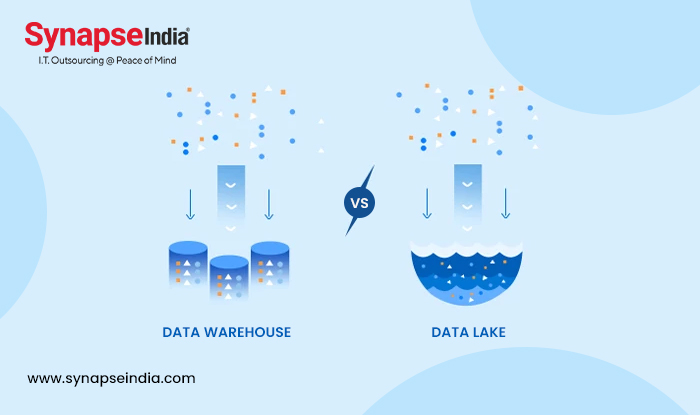 15 Dec 2023
15 Dec 2023
In the era of the digital landscape, data has emerged as a critical asset for organizations to get insights, make informed decisions, and drive innovation. Two key players in the realm of data management are Data Lakes vs. Data Warehouses. While both serve as repositories for storing and managing vast amounts of data, they differ significantly in their architectures, purposes, and capabilities. In this blog, we'll study the journey into the worlds of Data Lakes and Data Warehouses, understand their characteristics, and unravel the distinctions that set them apart.

A Data Lake is a centralized repository that allows organizations to store structured, semi-structured, and unstructured data at any scale. Unlike traditional databases, Data Lakes enables the storage of raw, unprocessed data in its native format. This includes data from diverse sources such as logs, sensors, social media, and more.
Schema-on-Read:
Scalability:
Diverse Data Types:
Cost-Effective Storage:
A Data Warehouse is a centralized repository that focuses on collecting, storing, and managing structured data from different sources within an organization. It is designed for query and analysis and is optimized for fast and efficient retrieval of aggregated and processed data.
Schema-on-Write:

| Features | Data Lakes | Data Warehouses |
|---|---|---|
| Purpose | Store vast amounts of raw and unstructured data | Store structured, processed, and organized data |
| Data Type | Handles structured, semi-structured, and unstructured data | Primarily structured data |
| Data Processing | Supports batch and real-time processing | Primarily supports batch processing |
| Schema-on-Read vs. Schema-on-Write | Schema-on-Read (flexible schema) | Schema-on-Write (rigid schema) |
| Data Storage | Stores data in its raw, native format | Stores data in a highly structured, optimized format |
| Data Transformation | Performs data transformation as needed | Pre-transformed data for quick querying |
| Query Performance | May have slower query performance due to the flexibility of schema-on-read | Typically offers faster query performance due to pre-defined schema |
| Cost | Generally more cost-effective for storing large volumes of raw data | May be more expensive due to optimized storage and processing |
| Use Cases | Exploration and analysis of raw, diverse data | Business intelligence, reporting, analytics |
| Latency | Variable latency, suitable for both real-time and batch processing | Low-latency, optimized for fast query response |
| Scalability | Highly scalable, can handle massive amounts of data | Scalable, but may require additional considerations for very large datasets |
| Data Governance | Requires robust governance due to the diversity and volume of data | Typically has well-established governance processes and controls |
| Example Technologies | Apache Hadoop, Apache Spark, Amazon S3 | Snowflake, Amazon Redshift, Google BigQuery |
In the landscape of data management, both Data Lakes vs. Data Warehouses play crucial roles, catering to different organizational needs and use cases. The choice between the two often depends on the nature of the data, the organization's analytical requirements, and the scalability considerations.
Data Lakes offer flexibility and scalability, making them suitable for handling diverse and raw data types. They are particularly valuable for organizations exploring big data analytics and machine learning. On the other hand, Data Warehouses excel in providing optimized environments for structured data, supporting business intelligence and analytical queries for decision-making. Whether looking at the depths of unstructured data in a lake or navigating the structured corridors of a warehouse, organizations can harness the power of both paradigms to fuel their journey in the data-driven era.

 09 Jan 2024
09 Jan 2024
